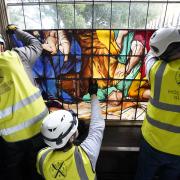George Leonard Johnson was born on November 25, 1921 in Hameringham, Lincolnshire, an apposite county considering what was to come. Dubbed ‘Bomber County’, its airfields looked towards the North Sea and German targets. George, known familiarly as ‘Leonard’, was the sixth and last born to Charles Johnson and Mary née Henfrey who died when George was three, leaving his father raising the family in straightened circumstances. George’s association with our county began in 1932 when the eleven-year-old arrived at the Lord Wandsworth Agricultural College in Long Sutton, near Hook, in the North Hampshire countryside. It’s named after banker’s son, Liberal MP and later peer, Baron Sydney Stern, 1st Lord Wandsworth, who’d left a bequest (1912) to establish a college to educate the children of agricultural workers, children who’d lost one or both parents and would benefit from a boarding school.
A site was duly acquired with the first ‘Foundation’ students arriving in 1922 and fee-payers joining them in 1946. The college had therefore been up and running for a decade when Johnson arrived in September 1932; four months later Hitler came to power in Germany. Apparently, its mission statement in the early-30s was to: ‘undertake the entire responsibility for the maintenance and education up to the age of 21 years or such earlier age as the child may be judged to be in a position to earn its own living’. The agricultural college, as it was at the time, a home to around 150 boys come the early-30s, didn’t let Johnny down.

The journey to Hampshire was made by train with Johnson and other boys arriving at Winchfield station from where school transport took over. It’s fair to say the next seven years moulded Johnny, making him the kind of material suitable for the RAF from learning to be part of a community run by ex-military bods to adopting the ‘neutral’ accent that blended him into service life; this was due to Lord Wandsworth being a melting pot of regional accents. Like all newcomers Johnson began in the Junior House, then moved up to senior school aged 13, also becoming a decent sportsman, a handy runner and a First XI footballer and cricketer.
Having passed his School Certificate, Johnson set his heart on a career in horticulture, his first job being a park keeper’s assistant in Basingstoke. He’d left Lord Wandsworth in December 1939 by which time Britain was at war with Germany, albeit during the period known as the ‘Phoney War’ when the lull saw sandbagging of buildings, distribution of gas masks and scouring of the skies for enemy bombers.

Johnny started work at Basingstoke’s Memorial Park on January 1,1940 then joined a local cricket club in the May just as the Phoney War ended (Germany invading France on May 10,1940, the day Churchill became PM).
It was late-June 1940 when Johnson, approaching 19, decided to join the war efforts. He volunteered to join the RAF having already decided he wanted to serve as aircrew. The war was already at a critical phase. The British Expeditionary Force had been evacuated from Dunkirk and the threat of invasion was on everyone’s mind. When he attended his medical it was discovered Johnson had a hernia, so he headed back to Basingstoke where a remedial procedure took place at the local hospital in August 1940. Whilst there, Basingstoke was bombed, a reminder if any were needed that the war was real and present. Recovered, Johnson returned to the Parks Department before finally getting his wish, reporting to RAF Cardington (Beds) on November 6,1940, just under three weeks before his 19th.

Johnson hoped to be a navigator, was selected for pilot training, failed to make the grade, and ended up a gunner. It was July 1942 when he was finally posted to RAF Woodhall Spa (Lincs) where he joined 97 Squadron. His first raid should have occurred on August 27,1942, however, engine failure led to a return home with the following night seeing his baptism of fire over Nuremberg. He was just 20. As Guy Gibson, commander of the Dams Raid was to say: ‘They die bravely, and they die young’. Johnson though was to be one of the lucky ones. He retrained as a bomb aimer after completing a full operational tour, which for Bomber Command was 30 missions.

It was late-March 1943 when Johnson reported to RAF Scampton having been selected to fly with 617 Squadron on the top-secret Operation Chastise. All leave was cancelled in the build-up; however, Johnny was permitted four days off to marry Gwyneth Morgan in April, a union that flourished over 60 years (until 2005) and bestowed three children. Johnson, flying with pilot Joe McCarthy, on Lancaster ‘T-Tommy’, attacked the Sorpe Dam, an earthen dam and therefore quite different to the Möhne and Eder Dams which were successfully breached during the raid. Dropping the bomb proved horrendously difficult and it was only on the tenth approach that Johnson finally released the precious cargo. The dam was damaged but wasn’t breached. Johnny nevertheless received the Distinguished Flying Medal (DFM) for his part in the raid.
Having been commissioned in November 1943 Johnson continued on ops until 1944 when he became a bombing instructor. He continued serving with the RAF until 1962, finally retiring with the rank of Squadron Leader, then embarked on a teaching career. His autobiography was published in 2014, he was awarded the MBE in 2017, and was further honoured by having a train named after him in 2018. He passed away last year on December 7 at the remarkable age of 101.
Chronology
1921 – George Leonard Johnson born in Hameringham, Lincolnshire (November 25).
1932 – Attends Lord Wandsworth College at Long Sutton in Hants.
1940 – Commences work for the Parks Department in Basingstoke. Joins RAF.
1942 – Johnson’s first bombing raid is over Nuremberg (August 27).
1943 – Marries Gwyneth Morgan, the same year as the famous Dams Raid.
1944 – Johnson ceases operational flying and becomes a bombing instructor.
1962 – Retires from the RAF with the rank of Squadron Leader.
2017 – George ‘Johnny’ Johnson is awarded the MBE at Buckingham Palace.
2022 – Death of George ‘Johnny’ Johnson in Westbury-on-Trim (December 7) aged 101.



























